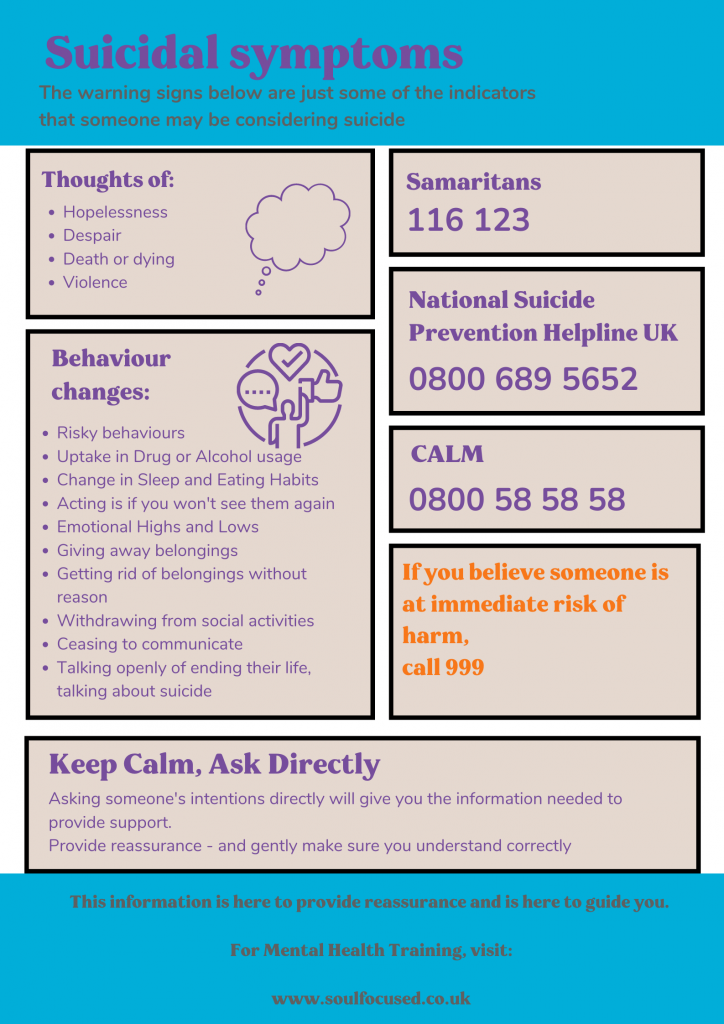Symptoms of Suicide and Suicidal Thoughts
Suicide or the taking of your own life is often a tragic reaction or consequence of poor mental health and stressful life situations. It’s much sadder because it can be prevented. Learning the warning signs and symptoms of suicidal thoughts or ideation along with how to reach out for immediate help and professional treatment can help. You could save a life; your own or someone else’s.
This article is a guide – full training courses available, if you are in need of medical attention – please contact your GP or the Samaritans on 116 123
Symptoms and Signs
There are many warning signs, though they differ from person to person. Also, warning signs aren’t always clear, whilst some people may make their intentions known, others can keep suicidal thoughts and feelings secret.
This makes it even more important for you to be aware. You need to be able to have supportive conversations if something doesn’t feel right.
Warning signs of suicide or suicidal thoughts can include:
- Talking openly about ending your life, talking about suicide, making statements along the lines of “It would be better if I wasn’t here”, “I wish I was dead” “I wish I was gone”
- Withdrawing from social activities, ceasing to communicate, not wanting to see anyone
- Risky behaviour such as increased use of alcohol or drugs, speeding or driving without care.
- Suddenly giving away belongings or getting rid of possessions without logical reason
- Feelings of hopelessness or despair
- Preoccupied with death, dying or violent behaviours
- Getting all affairs in order
- Changes in eating and sleeping habits or patterns
- Showing little to no care for own safety or wellbeing
- Acting is if you won’t see them again, maybe saying goodbye, becoming emotional
- Emotional highs and lows, being numb
- Personality changes – severely anxious, agitated; particularly when seen with other warning signs
If you are concerned about someone – asking directly about whether they are having suicidal thoughts or intentions is the best way to find out – do not be vague, or skirt around the issue – this takes courage and is something that we cover on the First Aid For Mental Health Training courses.
Asking directly and providing reassurance that you aren’t there to judge can help. Providing reassurance and gently asking again is the best way to identify if your concern is valid.
When to seek help
If you or someone you know is feeling suicidal, but there is no immediate thought of harming yourself or someone else.
- Reach out to someone you trust, a close friend, colleague or loved one – even if it’s hard to talk about your feelings
- Contact a teacher, manager or spiritual leader if you are part of a faith community
- Call a helpline, or 111
- Make an appointment with your GP or a mental health professional such as a counsellor or therapist
There is a downloadable signposting pack available – click the button below to get a copy for yourself:
Download Signposting PackWhat else can you do?
Take a First Aid for Mental Health course – equip yourself with the knowledge and skills to spot warning signs of suicide or suicidal thoughts early. Develop the confidence to have supportive conversations that allow people in crisis to open up, and then, signpost them to professional support. Continue supporting them. Suicidal thoughts don’t always mean someone wants to die. They may not see a way out of their current situation, or be feeling overwhelmed by the intensity of their current emotions.
Bookmark this article to read through and refresh your knowledge now and then. Sign up for the weekly newsletter for updates, tips and regular mental health courses in Essex and online.
Being a Mental Health First Aider means you are often the first point of contact before someone goes on to seek further professional support for their well-being. You can make a huge difference in someone’s story.


Recent Comments